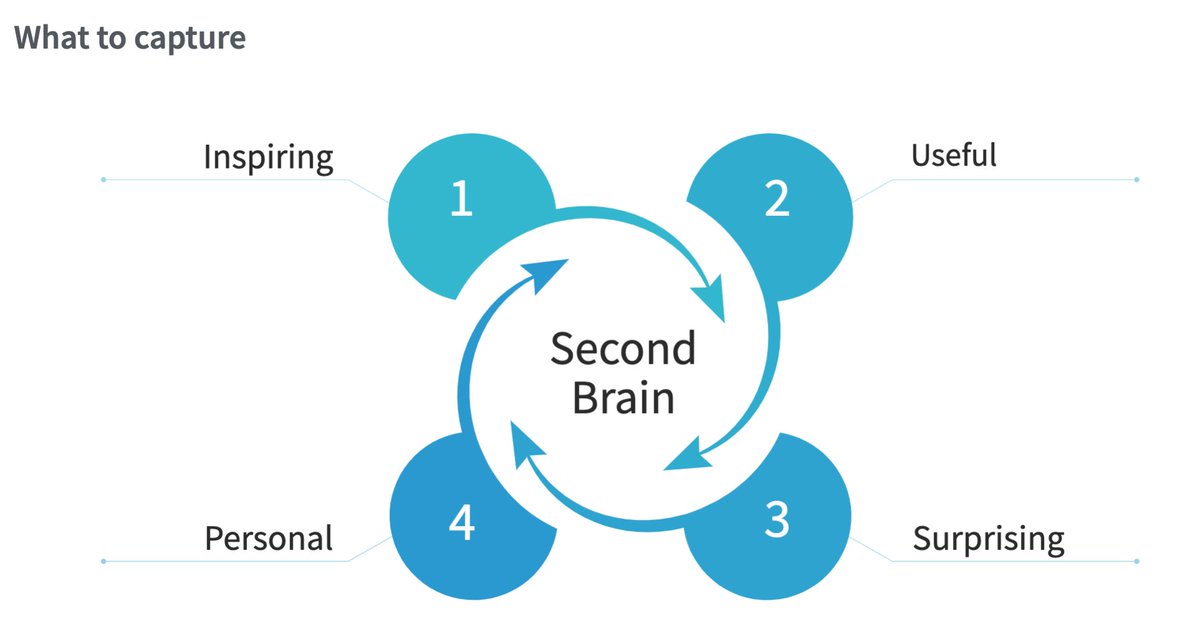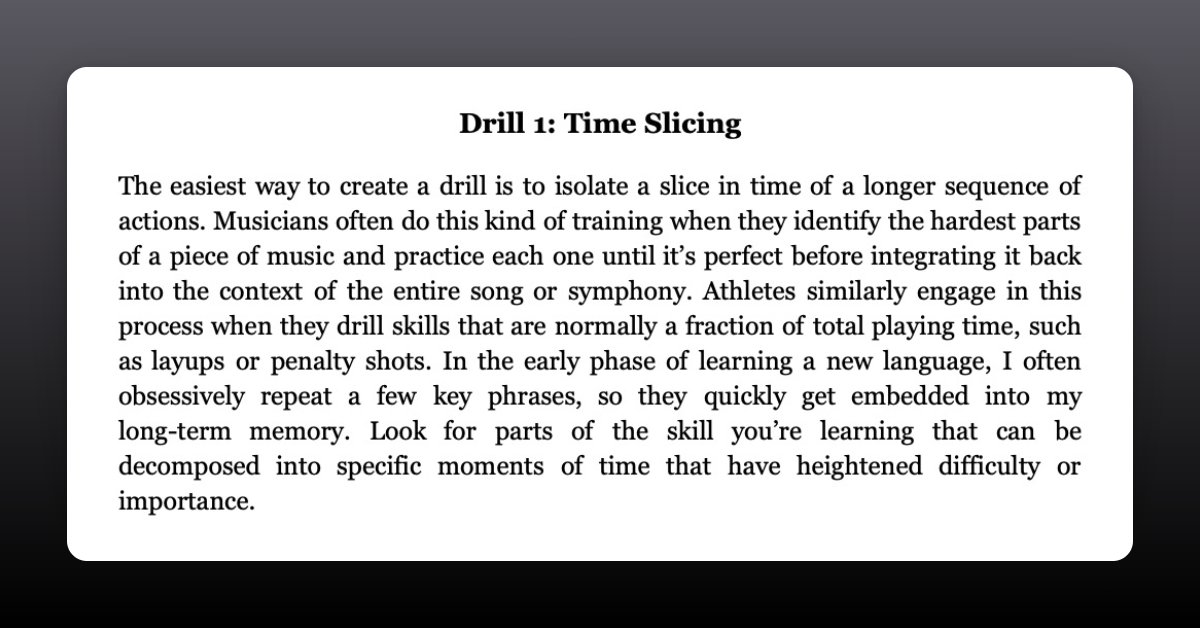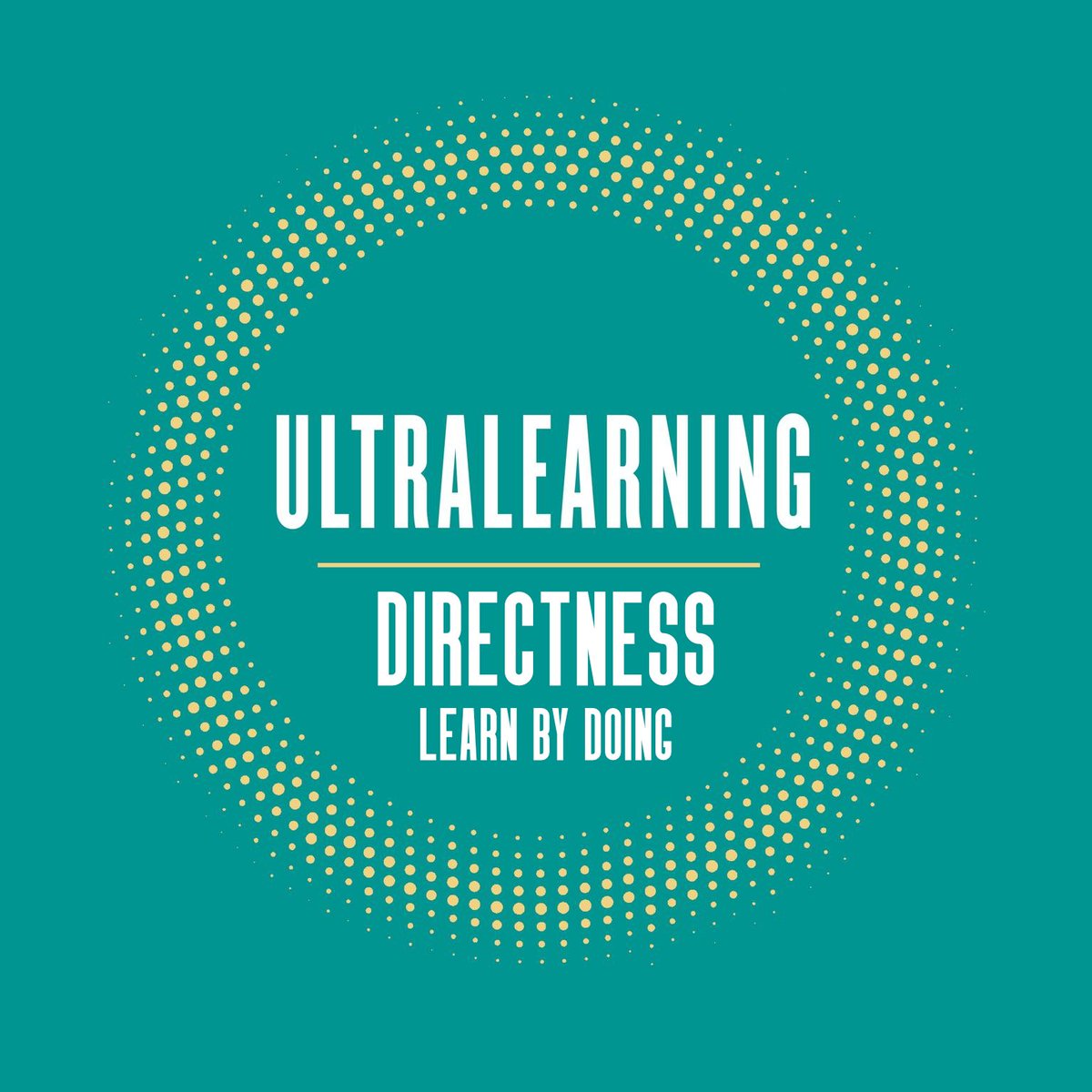Thread with notes from @fortelabs' Building a Second Brain course, cohort 11. 
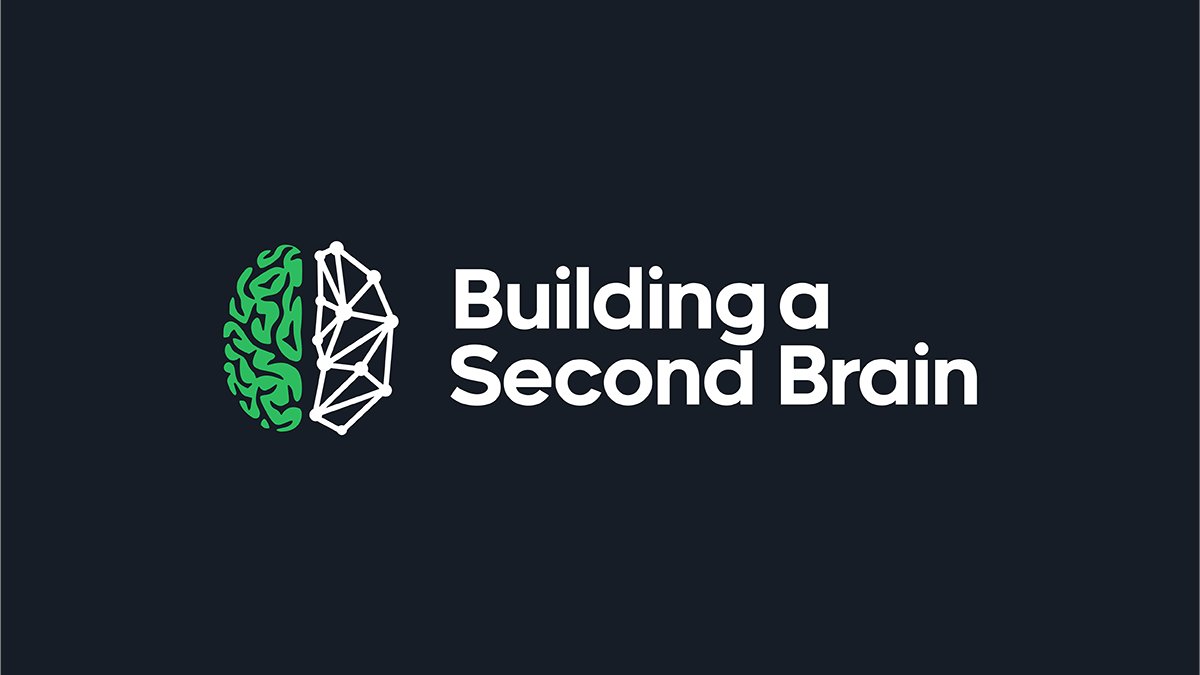
We live through economic eras.
Past economic eras:
• Space Era—available physical space was the limiting factor.
• Time Era—available time was the limiting factor.
We're transitioning out of the Attention Era into the Perspective Era.



Past economic eras:
• Space Era—available physical space was the limiting factor.
• Time Era—available time was the limiting factor.
We're transitioning out of the Attention Era into the Perspective Era.
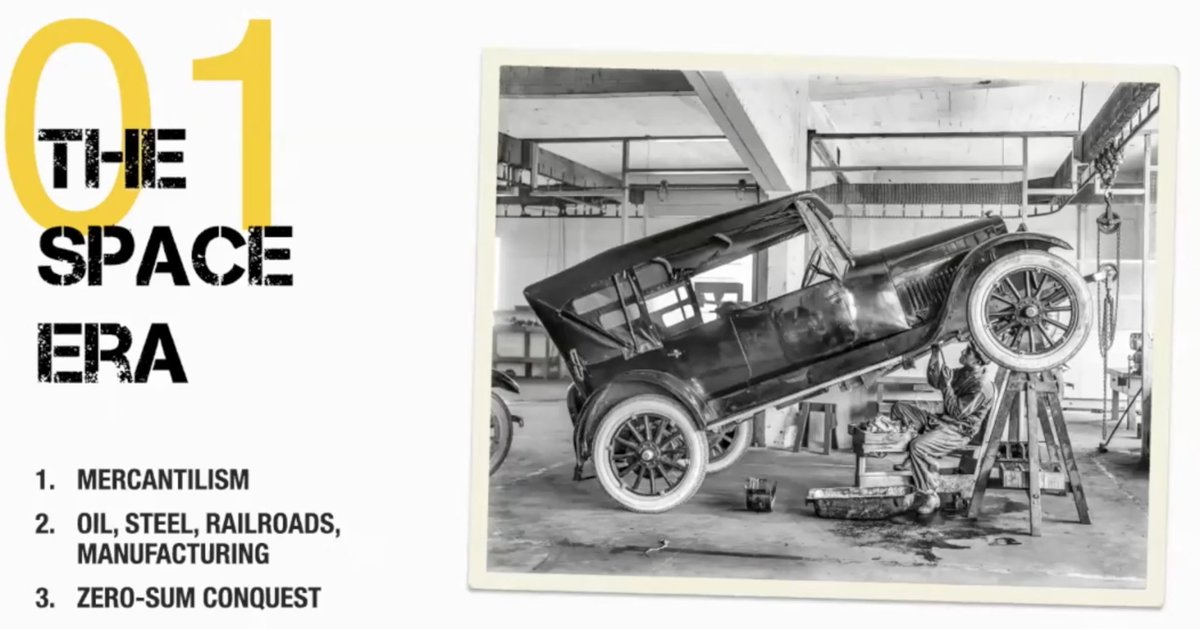
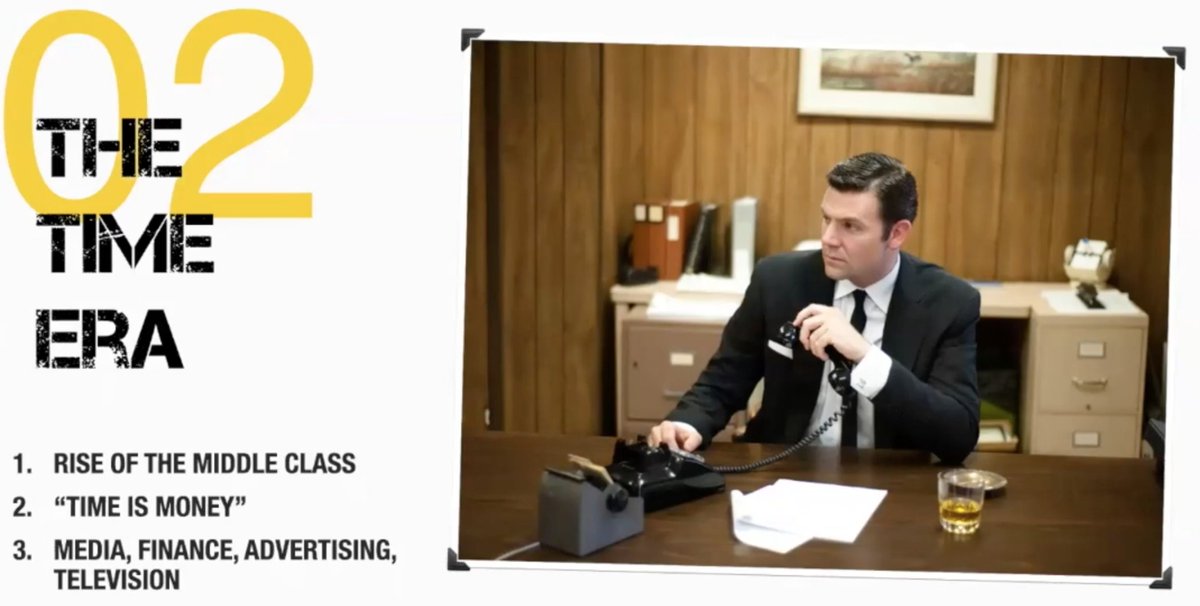
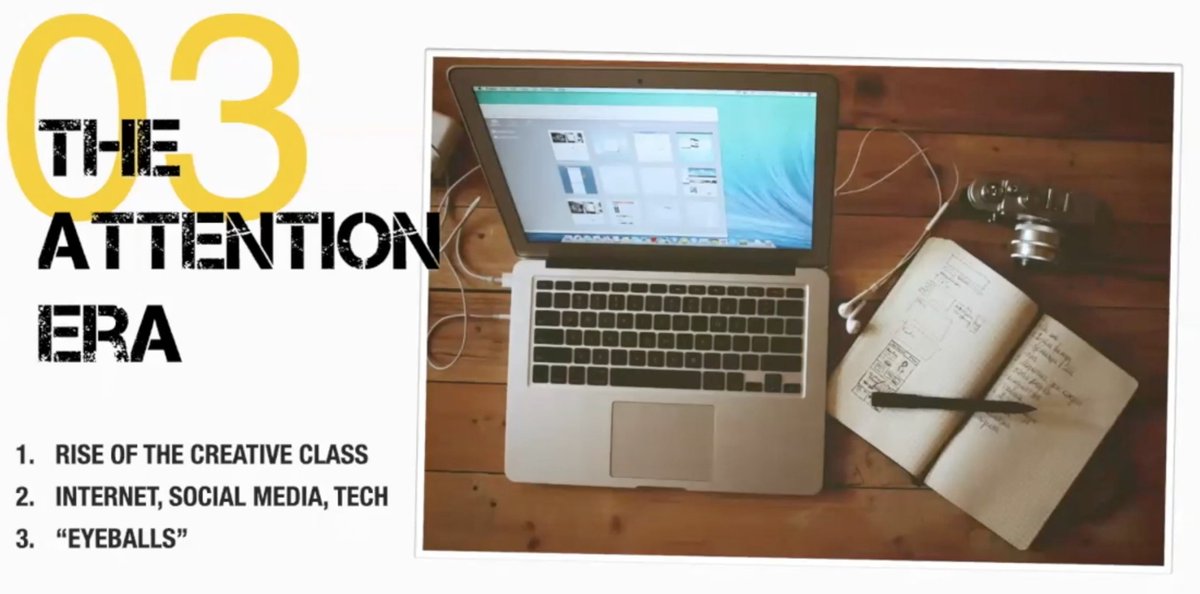
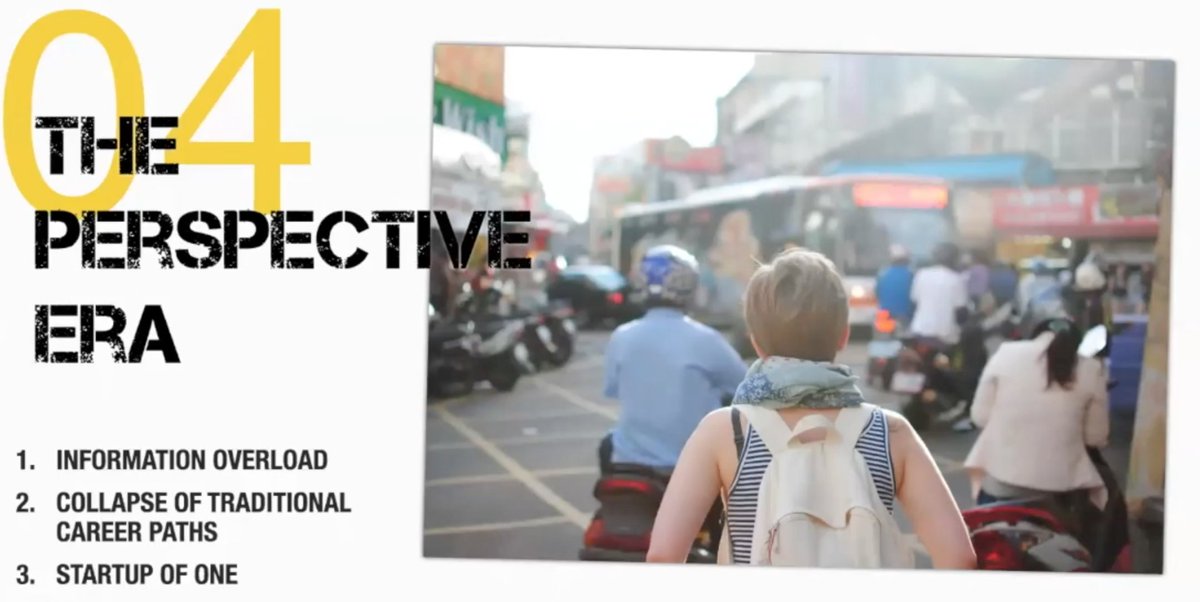
We live in the Perspective Era because everything is about information, automation, and being able to work solo.
Jobs least vulnerable to automation require people to have a particular interpretation of information (instead of simply reproducing information).
Jobs least vulnerable to automation require people to have a particular interpretation of information (instead of simply reproducing information).
"Point of View is that quintessentially human solution to information overload, an intuitive process of reducing things to an essential relevant and manageable minimum... In a world of hyper-abundant content, point of view will become the scarcest of resources." —Paul Saffo
Every creative process has the CODE elements:
• Capture—inputs.
• Organize—knowledge.
• Distill—wisdom.
• Express—insights.
• Capture—inputs.
• Organize—knowledge.
• Distill—wisdom.
• Express—insights.
Creativity is not just about imagination, it's also about organization and collaboration.
"What these findings suggest is that creativity doesn't just involve imagination. It also involves motivation, organization, and collaboration." —Scott Barry Kaufman
"What these findings suggest is that creativity doesn't just involve imagination. It also involves motivation, organization, and collaboration." —Scott Barry Kaufman
The three elements of Personal Knowledge Management:
• Personal organization
• Knowledge capture
• Project management
• Personal organization
• Knowledge capture
• Project management
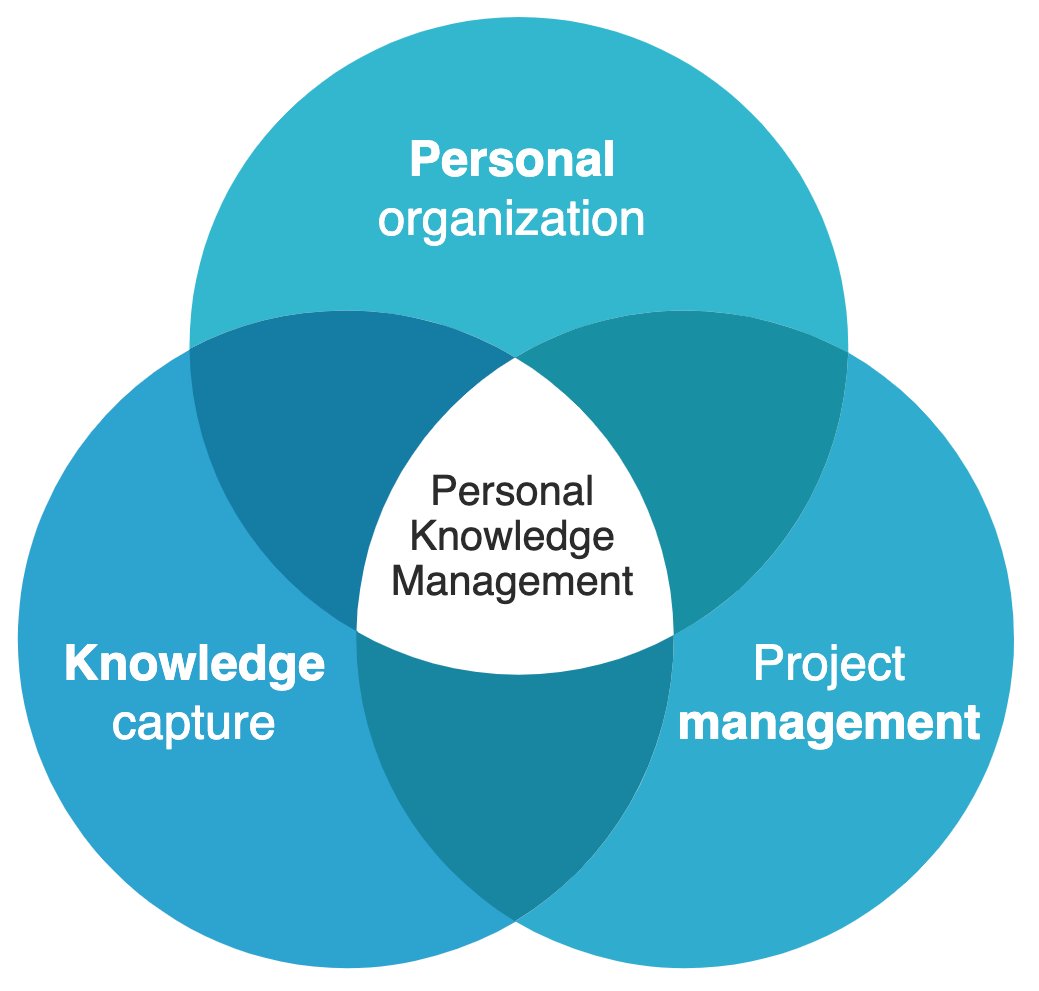
The four levels of Personal Knowledge Management
• Level 1: Storing information
• Level 2: Managing knowledge
• Level 3: Enabling action
• Level 4: Personal knowledge mastery
• Level 1: Storing information
• Level 2: Managing knowledge
• Level 3: Enabling action
• Level 4: Personal knowledge mastery
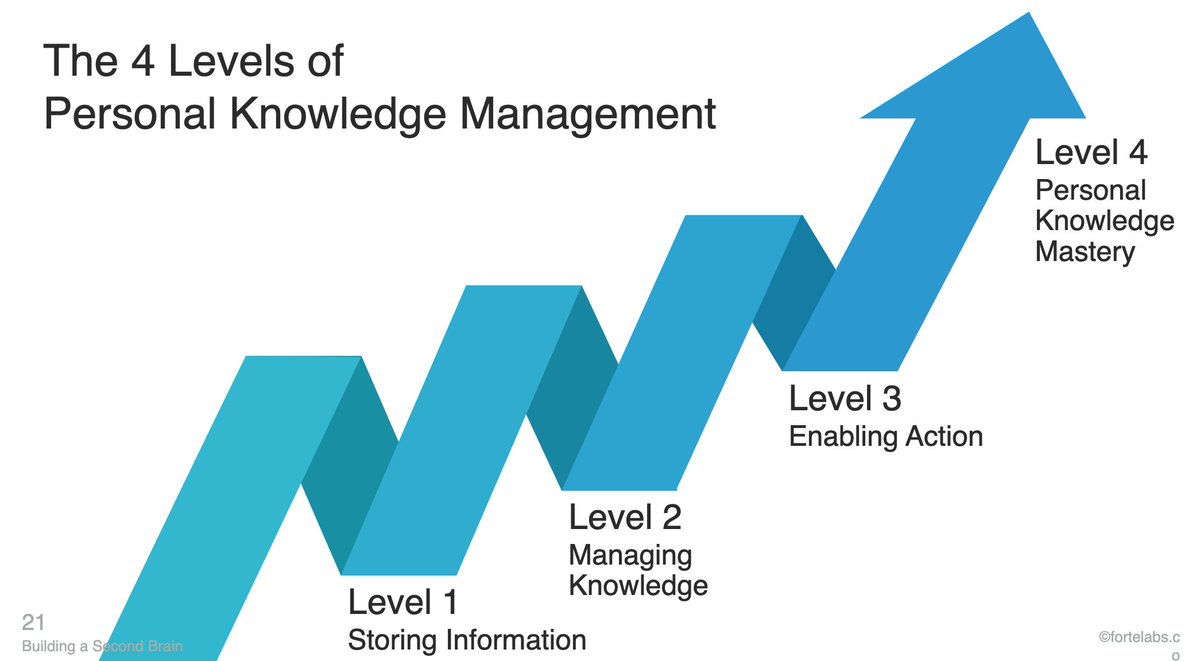
Start with a clean slate when you start organizing your files and notes.
Move everything into a dated archive, so you can focus on your creative projects. Pull things out of your archive when necessary, but don't go for a big bang.
Move everything into a dated archive, so you can focus on your creative projects. Pull things out of your archive when necessary, but don't go for a big bang.
Tiago's lessons from starting with a clean slate:
• Most information is never relevant again.
• Most information can be found easily through search.
• Creating new things is what matters, not organization.
• People need clear workspaces to be able to create.
• Most information is never relevant again.
• Most information can be found easily through search.
• Creating new things is what matters, not organization.
• People need clear workspaces to be able to create.
The key lesson in PARA:
Don't organize information by topic or type; organize it based on the actionability of the information.
• Projects = directly relevant.
• Areas = repeatedly relevant.
• Resources = intermittently relevant.
• Archives = previously relevant.
Don't organize information by topic or type; organize it based on the actionability of the information.
• Projects = directly relevant.
• Areas = repeatedly relevant.
• Resources = intermittently relevant.
• Archives = previously relevant.
For projects, it's important to define an outcome.
• Think of what you would like to exist in the real world after you've finished the project.
• "Finished course" isn't a real outcome; define what you'll have created upon completing the course.
• Think of what you would like to exist in the real world after you've finished the project.
• "Finished course" isn't a real outcome; define what you'll have created upon completing the course.
To feed your second brain, set up capture systems.
To help you guide the setup of your system, ask:
• Why capture?
• What to capture?
• How to capture?
• Where to capture?
To help you guide the setup of your system, ask:
• Why capture?
• What to capture?
• How to capture?
• Where to capture?
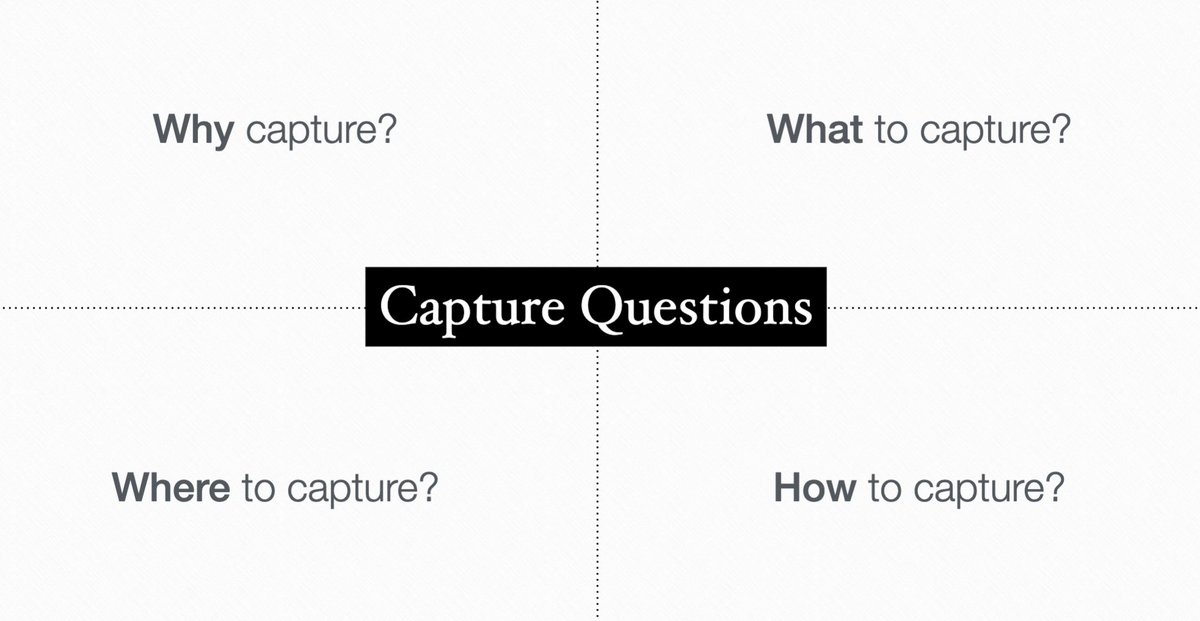
Why should we bother capturing information?
• Work is getting faster paced, so there's almost no time to do research.
• You already consume stuff, why not make just a little bit of effort once to set up capture systems? After setting up, they don't need much upkeep.
• Work is getting faster paced, so there's almost no time to do research.
• You already consume stuff, why not make just a little bit of effort once to set up capture systems? After setting up, they don't need much upkeep.
Why capture? Why not just Google everything?
• Google shows the common denominator. It doesn't help you gain insights as most content lacks depth.
• Insight is unexpected and requires time to get to you. You don't know what you don't know.
• Google shows the common denominator. It doesn't help you gain insights as most content lacks depth.
• Insight is unexpected and requires time to get to you. You don't know what you don't know.
The principles of information capture:
• Ease
• Automation
• Effortlessness
If a capture process doesn't meet these principles (and it thus feels like a heavy lift), reconsider the process.
• Ease
• Automation
• Effortlessness
If a capture process doesn't meet these principles (and it thus feels like a heavy lift), reconsider the process.
Capture inspiring information.
Our digital environments need to be inspiring as we spend the majority of our days in it.
Your second brain is one of the few spaces (digital or physical) that you truly control. So why not make it to your liking?
Our digital environments need to be inspiring as we spend the majority of our days in it.
Your second brain is one of the few spaces (digital or physical) that you truly control. So why not make it to your liking?
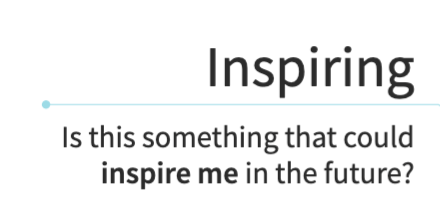
Capture useful information.
Useful sources are building blocks for our creative work.
Knowledge capture is like Tetris; you rarely get the block you need now, so you need a second brain to store the useful blocks for the future.
Useful sources are building blocks for our creative work.
Knowledge capture is like Tetris; you rarely get the block you need now, so you need a second brain to store the useful blocks for the future.
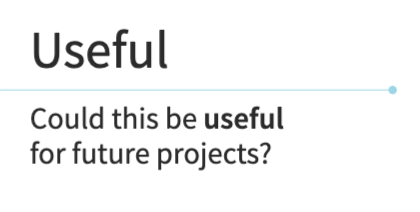
Save in your second brain what surprises you.
There's no need to store what you already know or agree with; challenges yourself.

There's no need to store what you already know or agree with; challenges yourself.
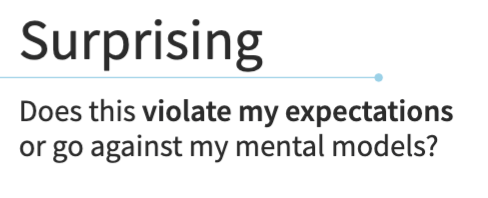
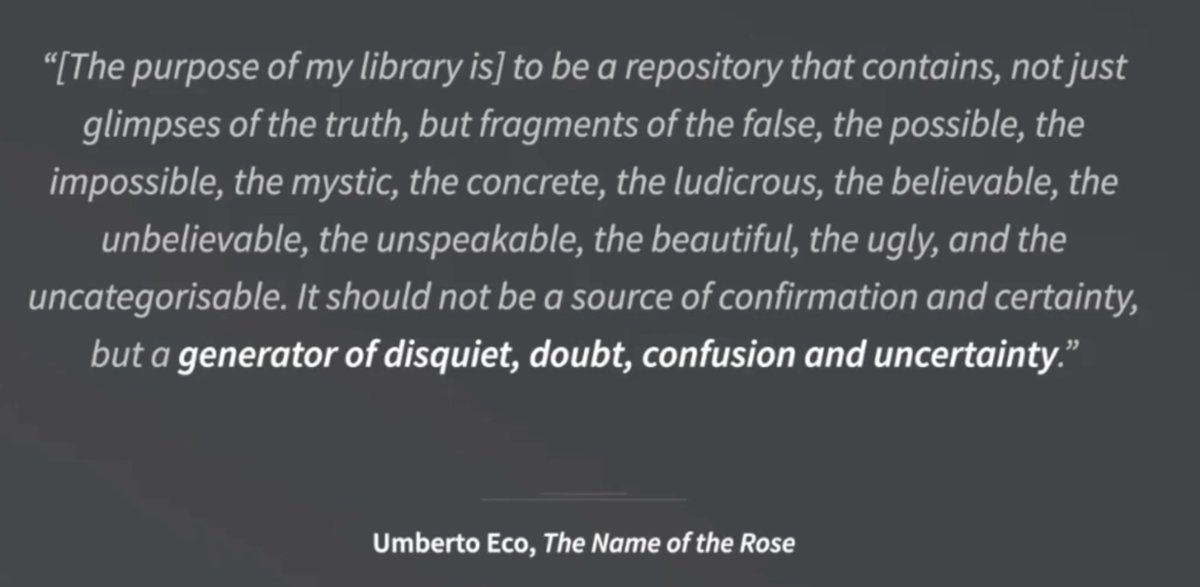
Capture your personal experiences.
You can't Google what you learned through personal experience, which is super useful material to save in your second brain.
Journaling is not just to get things off your chest; it's a tool to learn from the past.
You can't Google what you learned through personal experience, which is super useful material to save in your second brain.
Journaling is not just to get things off your chest; it's a tool to learn from the past.
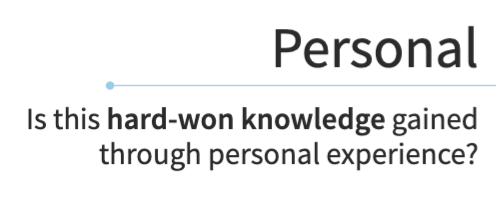
Like a woodworker, you should keep the scraps of your work.
Everything you do produces by-products; things like sketches, abandoned essays, scrapped paragraphs.
Keep your by-products in your second brain—they can serve as building blocks for future creative work.
Everything you do produces by-products; things like sketches, abandoned essays, scrapped paragraphs.
Keep your by-products in your second brain—they can serve as building blocks for future creative work.
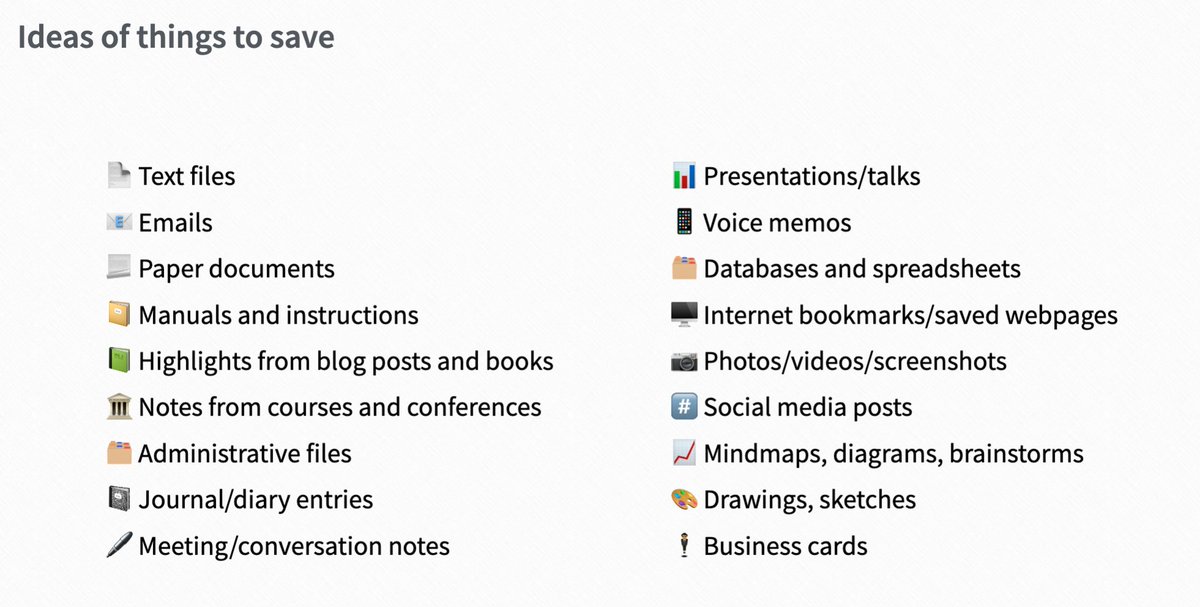
Where to capture your knowledge?
Obviously, in your second brain! But other storing places act as a source for your second brain.
You need to be aware of where your captured content is living. Automate the flow from sources into your second brain as much as possible.
Obviously, in your second brain! But other storing places act as a source for your second brain.
You need to be aware of where your captured content is living. Automate the flow from sources into your second brain as much as possible.
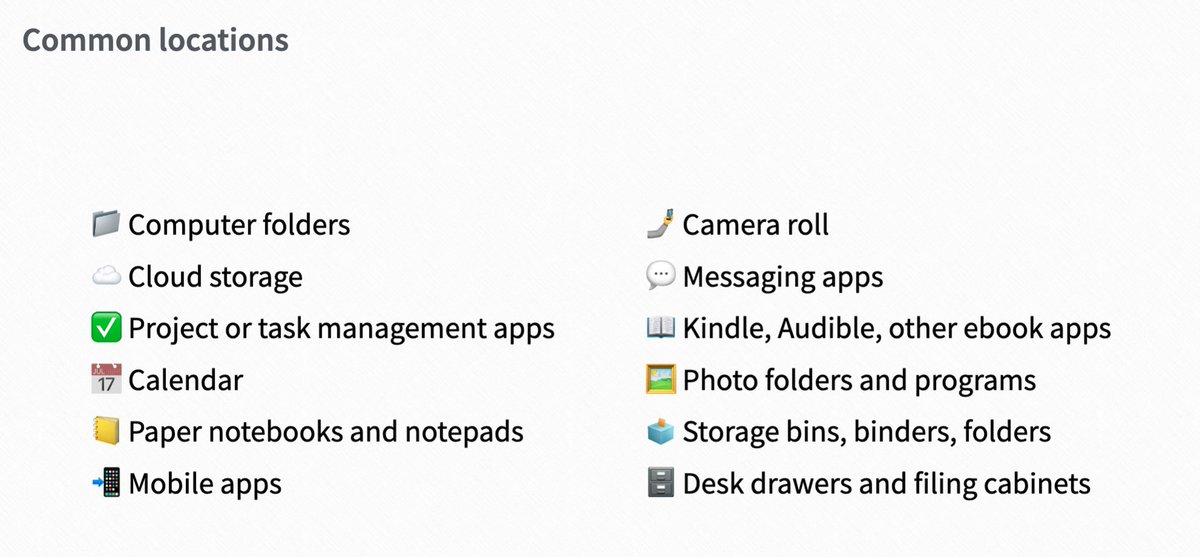
How to capture information?
Simple! Using capturing systems like read-it-later apps and @readwiseio.
Simple! Using capturing systems like read-it-later apps and @readwiseio.
• • •
Missing some Tweet in this thread? You can try to
force a refresh

